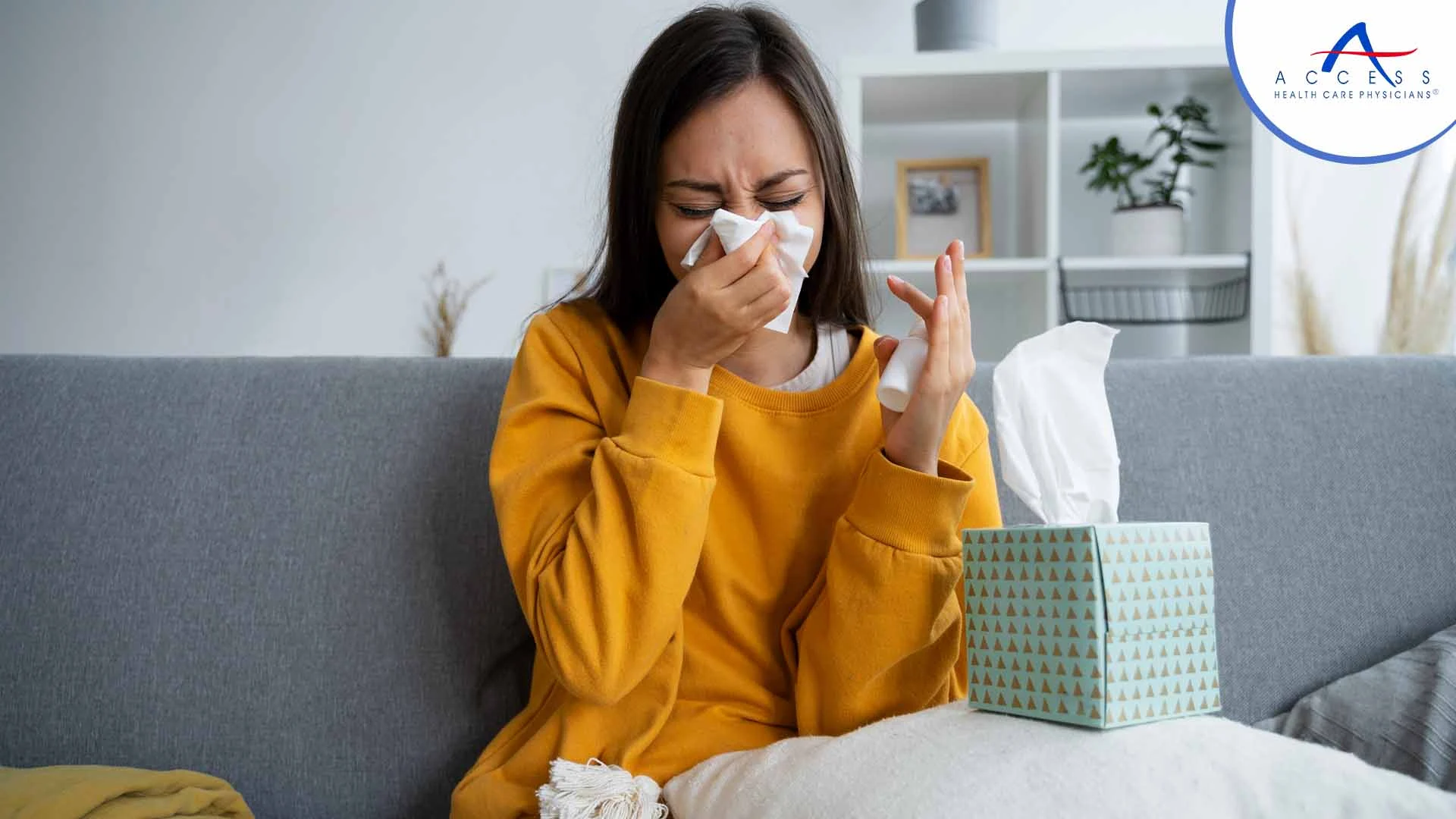As the symptoms of colds and allergies frequently coincide, many people question, "Is a cold just an allergy?"
It's easy to mistake allergies for colds as the seasons shift and sniffles become commonplace.
You have to decide what kind of medication you require before you open your medicine cabinet and begin looking for relief. Treatments for allergies and colds are not the same, therefore, it is important to understand the difference between the two.
Colds vs. Allergies
The rhinovirus is the main infectious agent that causes a cold, which is also known as the common cold. It usually spreads through particles when an infected person sneezes or coughs and it can be extremely contagious.
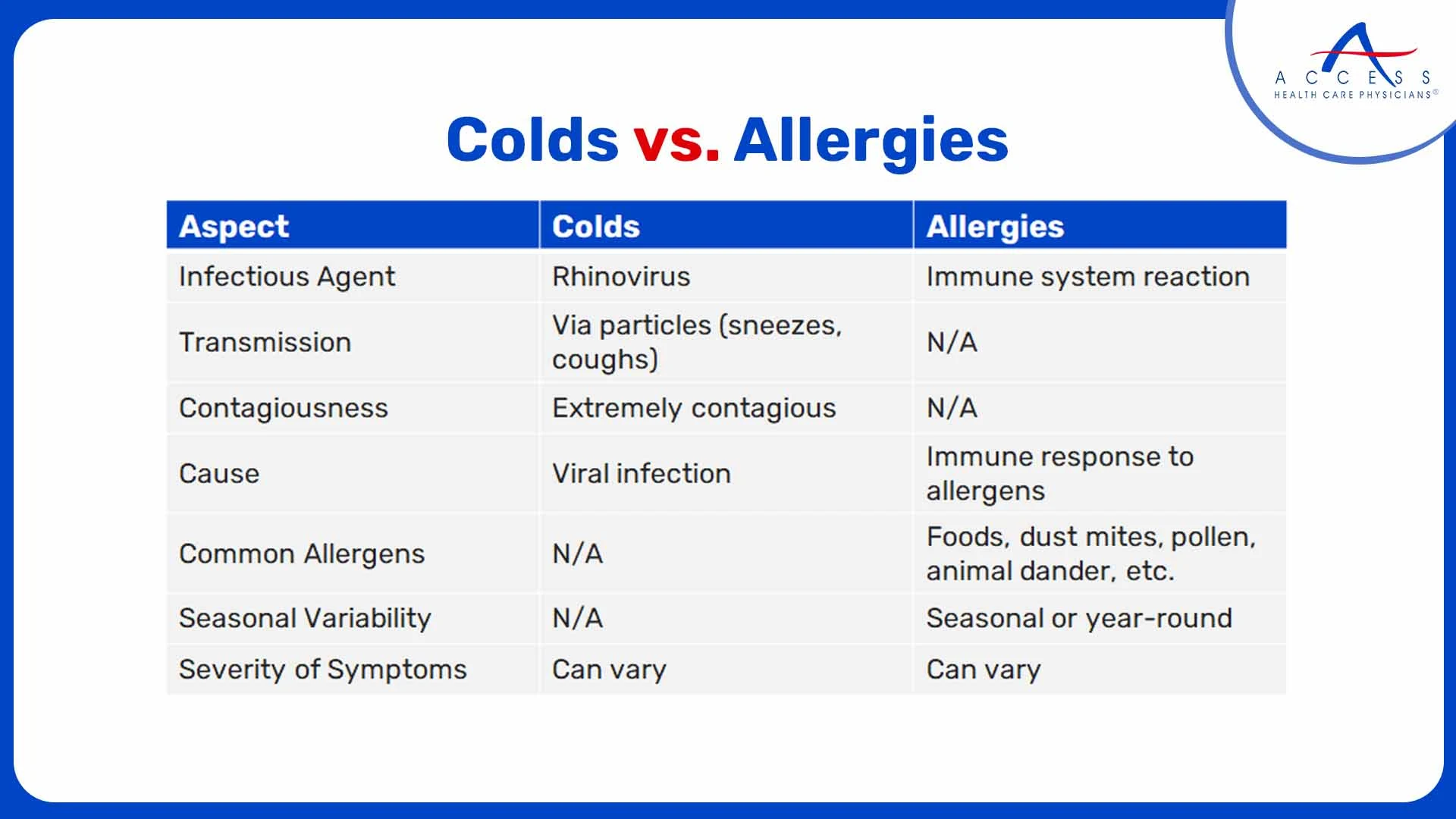
On the contrary, allergies are not brought on by a virus; rather, they are the result of the immune system's reaction to something that it believes to be dangerous. These substances, commonly referred to as allergens, are present in a variety of foods, dust mites, pollen, and animal dander, among other places.
Depending on the allergen, allergic reactions can range in severity and cause symptoms to appear all year round or only in certain seasons.
Symptoms of Cold vs Allergies
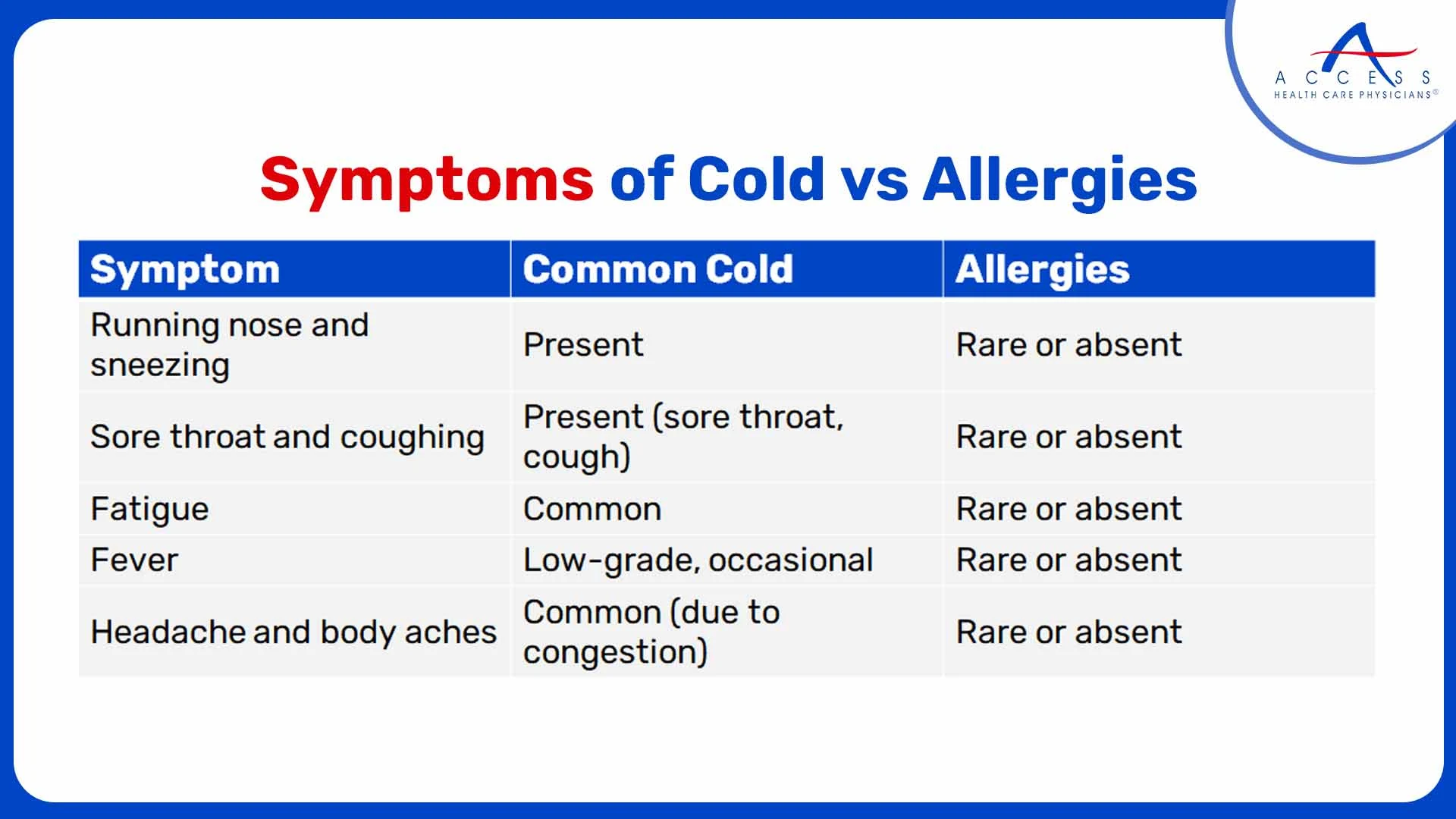
Common cold symptoms
● Running nose and sneezing:
Colds often produce nasal congestion, leading to a runny nose. Frequent sneezing is the body's way of trying to expel the virus from the respiratory system.
● Sore throat and coughing:
A scratchy or sore throat is often experienced during a cold, making swallowing and talking uncomfortable. It can also cause a persistent cough, usually a dry cough at first and later producing mucus.
● Fatigue:
Feeling tired and sluggish is a common symptom of a cold as the body's immune system works to fight off the infection.
● Fever:
Low-grade fever is possible but not always present in colds. It indicates the body's effort to combat the virus.
● Headache and body aches:
Headaches can occur as a result of congestion and sinus pressure. Muscular aches and body pain are a result of the body's immune response.
Common Symptoms of Allergies
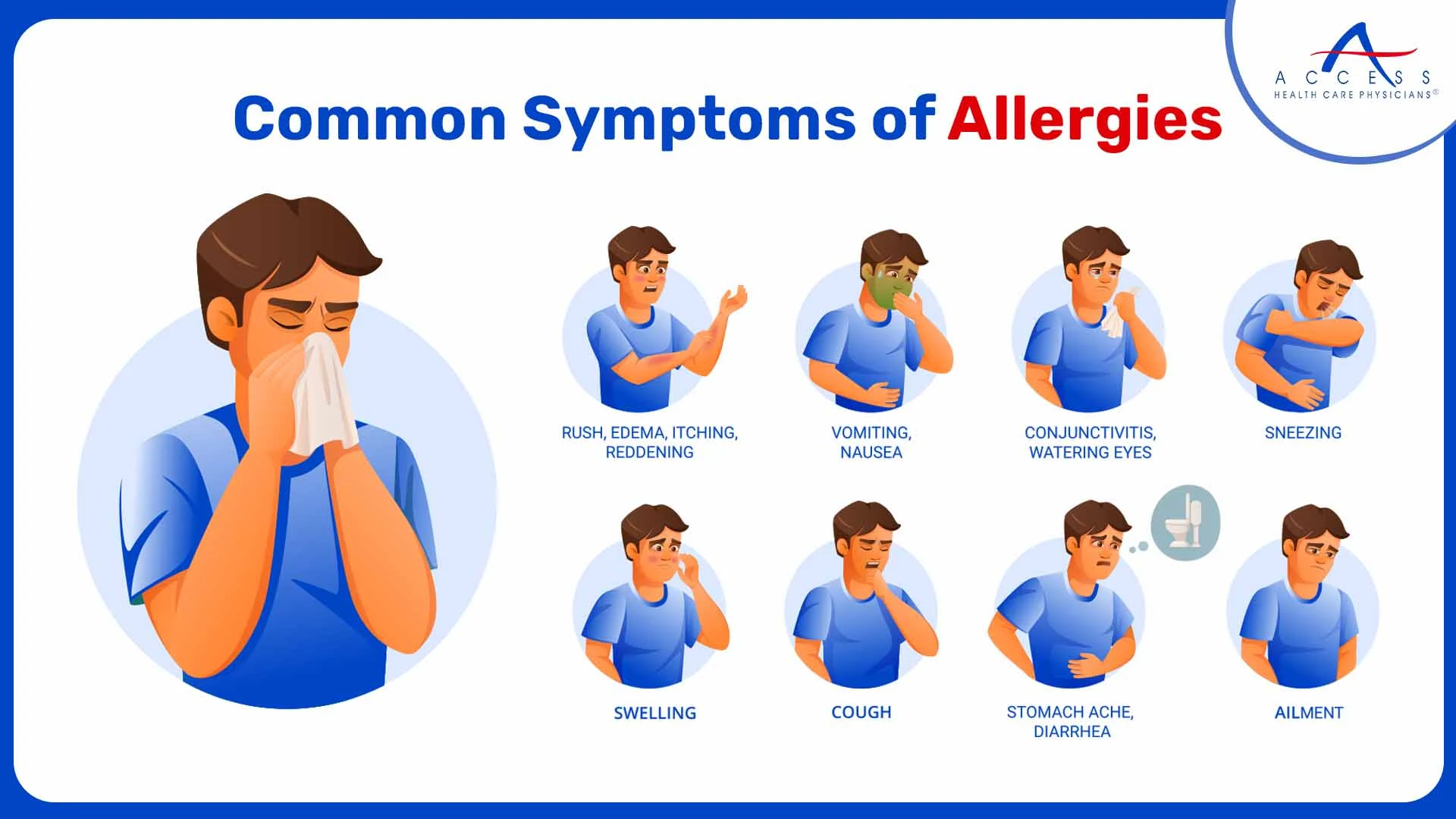
● Allergies can also cause a runny or stuffy nose, often accompanied by sneezing. However, unlike a cold, the nasal discharge is typically clear and thin.
● Itchy, watery eyes are a trademark sign of allergic reactions, often accompanied by redness.
● Although less common, allergies can sometimes lead to a sore throat due to postnasal drip.
● Allergies can also cause a persistent, dry cough, particularly if the allergen is inhaled or irritates the throat.
Treatment Options for the Common Cold
● Ensure to get plenty of rest as it allows your body to allocate more energy to fighting off the virus.
● Stay hydrated. Drinking fluids, such as water, herbal teas, and even infused water, helps maintain your body's hydration and supports the immune system.
● Over-the-counter (OTC) cold remedies can help alleviate symptoms.
● Inhaling steam from a bowl of hot water can help relieve nasal congestion and ease breathing.
● Sometimes natural remedies are handy as well. A warm cup of tea with honey can soothe a sore throat and provide relief from coughing. ● In some cases, your primary care doctor may prescribe antiviral medications for severe or prolonged cold symptoms.
Treating Allergies
● Identifying and avoiding allergens is the very first step. This can include keeping windows closed, using air purifiers, or reducing exposure to specific allergens.
● Over-the-counter or prescription antihistamines can help relieve allergy symptoms, including runny nose and sneezing.
● Nasal Corticosteroid are prescription medications that can help reduce inflammation in the nasal passages and provide long-term relief for allergy symptoms.
● Allergy shots (immunotherapy) can also be considered for individuals with severe allergies who do not respond to other treatments.
● Saline nasal sprays are known to help rinse allergens from the nasal passages.
For persistent or severe allergies, it's advisable to consult an allergist who can diagnose specific allergens and develop a personalized treatment plan. You can consult with your primary care physicians to guide you on the same.
Differentiating Between Colds and Allergies
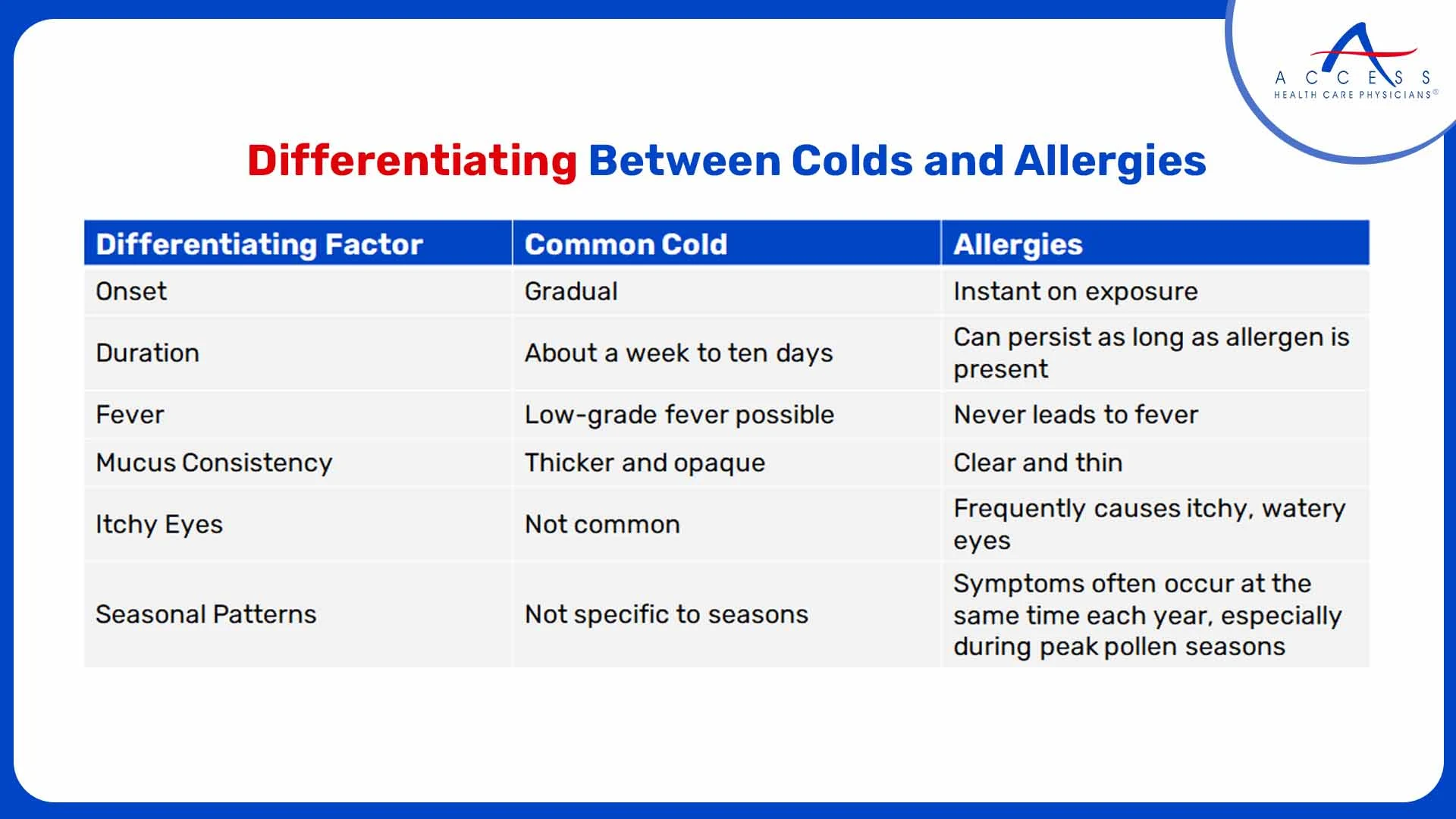
While the symptoms of colds and allergies can overlap, there are key differences that can help you distinguish between the two:
1. Onset:
Colds often have a gradual onset, while allergies can develop instantly on exposure to allergens.
2. Duration:
Colds tend to last a week to ten days at the most, whereas allergy symptoms can persist as long as the allergen is present.
3. Fever:
Colds can cause a low-grade fever, while allergies never lead to fever.
4. Mucus Consistency:
The common cold mucus tends to be thicker and more opaque, whereas allergy-related mucus is clear and thin.
5. Itchy Eyes:
Allergies frequently cause itchy, watery eyes, which are not common with colds.
6. Seasonal Patterns:
If your symptoms occur at the same time each year, especially during peak pollen seasons, it's more likely to be allergies.
Understanding these differences is important for effective management. If you're unsure about whether you have a cold or allergies, it's advisable to consult with a healthcare professional for an accurate diagnosis and tailored treatment recommendations.
Reach out to Access Health Care Physicians to book an appointment.
Frequently Asked Questions
While allergy symptoms last depending on how long you are exposed to the allergen, a cold rarely persists for more than two weeks—most people who get a cold tend to heal on their own.
A runny nose can be a symptom of an allergy, the difference is confirmed via the mucus.
Aquagenic urticaria is a rare allergy that causes itchy and painful hives to break out.
No, the two are very distinct even though their symptoms might overlap at times.
